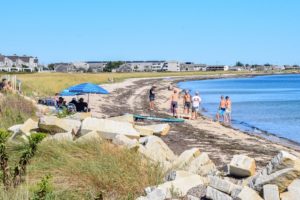PROVINCETOWN — The town landing at Breakwater Beach was “posted” on Sept. 1 and 2 —closed to swimming due to the presence of bacteria.

Such closures happen each summer, but they have been less frequent since Commercial Street was resurfaced with porous pavement to reduce runoff, said Board of Health Chair Steve Katsurinis. That effort has noticeably decreased beach closures.
After the last “failed” test was processed, the sampling season ended, said Health Agent Lezli Rowell. The state’s “bathing season” ends a week before the Swim for Life in Provincetown, so beach closures won’t interfere with that event. Off-season signs tell swimmers they should swim at their own risk, Rowell noted.
During the bathing season, from mid-June through Labor Day weekend, public beaches in Massachusetts are tested — usually weekly. The tests look for the presence of bacteria in the Enterococci group, which are not pathogenic in themselves but are indicators for other dangerous bacteria that live in human and animal waste. Contaminated waters can lead to infections and gastrointestinal illness.
At most beaches, if a sample is over a certain level a follow-up sample is taken the next day. If both are over the limit, then the beach is “posted,” or closed to swimming, until follow-up tests show the water is safe again.
Most postings last about 72 hours, according to Katsurinis. Closures are highly correlated to rainstorms, which wash dog poop and other biological debris into the ocean.
Human waste can also be a contaminant, but the town’s sewer engineers say that in-ground septic systems are no longer a likely culprit here, Katsurinis said. The correlation between storms and beach closures is very tight, while septic systems run constantly. “There’s no way for the sewer to overflow into the stormwater system,” Katsurinis added.



